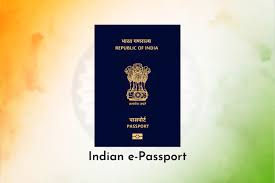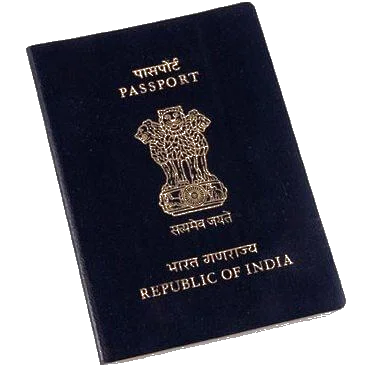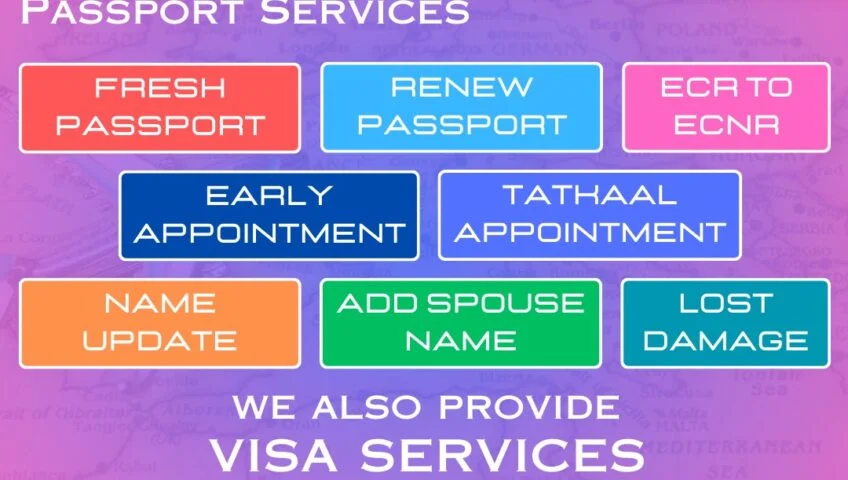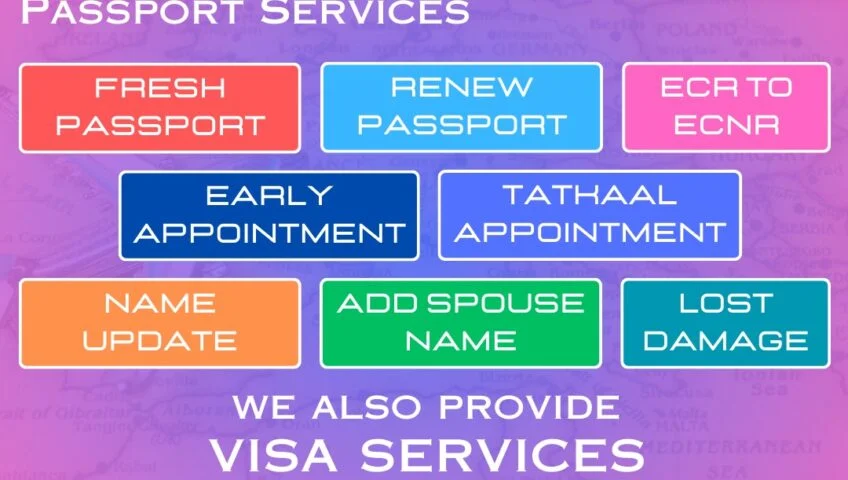Key Implications of Having an ECR Passport 9968875644 In the landscape of international travel and employment for Indian citizens, the passport is not just an identity document; it is a critical instrument that defines one’s mobility and legal requirements abroad. Among the various categories, the Emigration Check Required (ECR) status holds a profound and distinctive set of implications, primarily impacting those seeking work in specific foreign countries.
The ECR classification is a bureaucratic designation with deep social and legal roots, established under India’s Emigration Act, 1983. It is a protective mechanism, a governmental safeguard designed to shield certain vulnerable segments of the workforce—those lacking formal education or seeking unskilled/semi-skilled labour—from exploitation, fraudulent recruitment, and hazardous working conditions abroad.
For a passport holder, having the ECR stamp means entering a regulatory framework that mandates a special clearance process. The consequences of this classification are far-reaching, affecting travel plans, employment access, bureaucratic timelines, and overall peace of mind.
1. The Core Implication: Mandatory Emigration Clearance (EC) : Key Implications of Having an ECR Passport 9968875644
The most direct and significant consequence of the ECR status is the legal requirement to obtain Emigration Clearance (EC) from the Protector of Emigrants (PoE)—an office under the Ministry of External Affairs—before traveling to 18 specific countries for the purpose of employment.
A. The Requirement for Employment
If an ECR passport holder secures an employment visa to work in an ECR-notified country (predominantly the Gulf Cooperation Council or GCC states and select Southeast Asian nations), they must complete the clearance process. This involves submitting their employment contract, visa details, and other documents to the PoE for thorough verification.
The clearance serves as the government’s green light, confirming that the employment terms are legal, non-exploitative, and that the worker is aware of their rights and responsibilities.
B. Consequences of Non-Compliance
The failure to obtain the mandatory EC can result in severe travel disruption. The Bureau of Immigration at Indian international airports is authorized to stop ECR passport holders from boarding their flight to ECR countries if they are traveling on an employment visa without the requisite clearance. This restriction is an enforcement of the law, not a mere formality, and leads to immediate cancellation of travel plans.
2. Geographical and Purpose-Driven Restrictions
The ECR status does not universally restrict international travel; its effect is highly specific to the destination and the purpose of the journey.
A. The ECR-Notified Countries
The list of countries for which the EC is mandatory includes:
Key Implications of Having an ECR Passport 9968875644
- Gulf Nations: United Arab Emirates (UAE), Kingdom of Saudi Arabia (KSA), Qatar, Oman, Kuwait, and Bahrain.
- Other Countries: Malaysia, Indonesia, Jordan, Lebanon, Thailand, Libya, Sudan, South Sudan, Syria, Iraq, Afghanistan, and Yemen.
Travel to any of these nations for work is regulated. Travel to all other countries (e.g., USA, UK, Canada, Australia, European nations) is generally unrestricted by the ECR status.
B. Travel for Non-Employment Purposes
Crucially, the Emigration Check is NOT required for ECR passport holders traveling for purposes other than employment. This means ECR status does not prevent travel for:
- Tourism/Visit: Visiting family, vacationing, or short-term stays.
- Education: Enrollment in foreign universities or educational institutions.
- Business: Short-term business meetings or conferences.
In these cases, the traveler only needs to present their valid passport, a valid non-employment visa (e.g., tourist or student visa), and a return ticket to the immigration authorities.
3. The Bureaucratic and Financial Burden
The process of obtaining Emigration Clearance adds several layers of administrative complexity and associated costs.
A. Extended Processing Time
EC clearance is an additional step in the travel preparation timeline. It requires the applicant to gather specific documents—often including a valid work contract attested by the Indian Mission/Post in the host country—and submit them to the PoE office. This process can be time-consuming, potentially delaying the departure date and adding stress to the worker and their recruiting agent.
B. Engagement with Recruiting Agencies
Most ECR workers rely on registered Recruiting Agents (RAs) to facilitate their employment abroad. The EC process often involves the RA submitting an affidavit to the PoE, guaranteeing the worker’s welfare and the authenticity of the job offer. While RAs provide a service, they may charge fees for documentation, medical tests, and the EC process itself, adding to the initial financial outlay of the worker.
C. Added Scrutiny
ECR passport holders, particularly at immigration checkpoints, may be subject to closer scrutiny. The immigration officer’s role is to ensure the ECR worker is not being trafficked or exploited and has the necessary clearance, which can lead to longer processing times and potential inconvenience compared to non-ECR holders.
4. Long-Term Impact on Professional and Social Mobility
The ECR status is often perceived as a designation of lower education or skill level, which can have subtle but persistent social and professional implications.
A. Perceived Skill Limitation
In a competitive global job market, the ECR stamp is an immediate indicator of a lack of a minimum educational qualification (10th pass). This can inadvertently limit access to better-paying, skilled positions and can influence a foreign employer’s perception of the worker’s eligibility for certain roles. Non-ECR status (ECNR) is, by contrast, associated with greater educational achievement and professional flexibility.
B. The Need for Status Upgradation
The ECR status is not permanent. However, to remove it, a worker must actively seek its removal by upgrading their passport to Non-ECR status. This requires a formal application for a passport re-issue and the submission of new documentation, such as a 10th-grade mark sheet, an income tax return (ITR), or proof of a long-term stay abroad (over three years). For individuals who attain higher qualifications or financial stability after their initial ECR passport is issued, the burden of bureaucratic effort remains to gain full, unrestricted travel freedom.

C. Impact on Dependents
The status can also indirectly affect minors. Children under 18 years of age whose parents are traveling on an ECR passport may also have an ECR stamp in their own passports, requiring an additional step to have it removed once they reach a certain age or their parents acquire ECNR status.
5. The Protective Rationale and its Double-Edged Nature
While the implications of ECR status often present as hurdles, it is vital to remember the underlying protective motive.
A. Combating Exploitation
The core purpose of the ECR mandate is to ensure that vulnerable workers are not lured by fake job offers, subjected to illegal working conditions, or exploited by unscrupulous agents. The EC process forces an official check on the employment contract’s authenticity, salary terms, and living conditions.

B. Government Oversight
It enables the Indian government, through its PoE offices, to maintain a registry and oversight of migrant workers heading to high-risk areas. In the event of an emergency, crisis, or dispute abroad, this mechanism facilitates faster and more effective governmental intervention and assistance.
However, this protection comes at the cost of reduced administrative autonomy for the passport holder and increased complexity for legal employment migration. For a worker who has legitimately secured a job, the mandatory clearance can feel like an unnecessary hurdle that adds friction to their career path.
Conclusion
The ECR designation in a passport is a significant regulatory mark that transforms a simple travel document into one that requires active compliance for employment migration to specific parts of the world. Its implications are clear: mandatory pre-departure Emigration Clearance (EC), heightened scrutiny at immigration, and an added bureaucratic and potentially financial layer to the job-seeking process.
While the process is rooted in a necessary protective philosophy—to safeguard India’s most vulnerable workers—it places the onus on the individual to prove the legitimacy and safety of their migration. Understanding the ECR status is not merely about knowing a stamp’s meaning; it is about recognizing the specific pathway and legal obligations one must follow to ensure a safe, compliant, and successful tenure of employment overseas. The ultimate goal for any eligible ECR holder is to actively work towards converting their status to Non-ECR, thereby granting them the full flexibility and administrative ease that comes with unrestricted international mobility.


